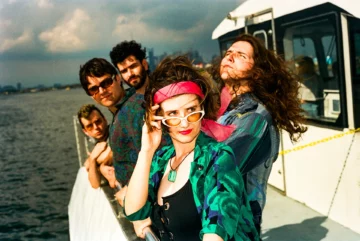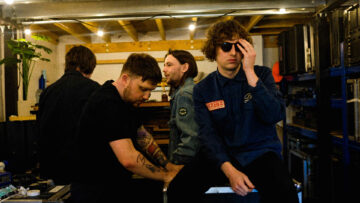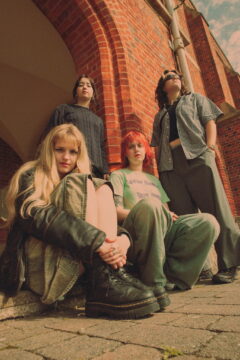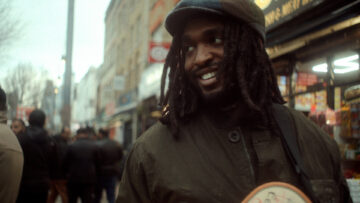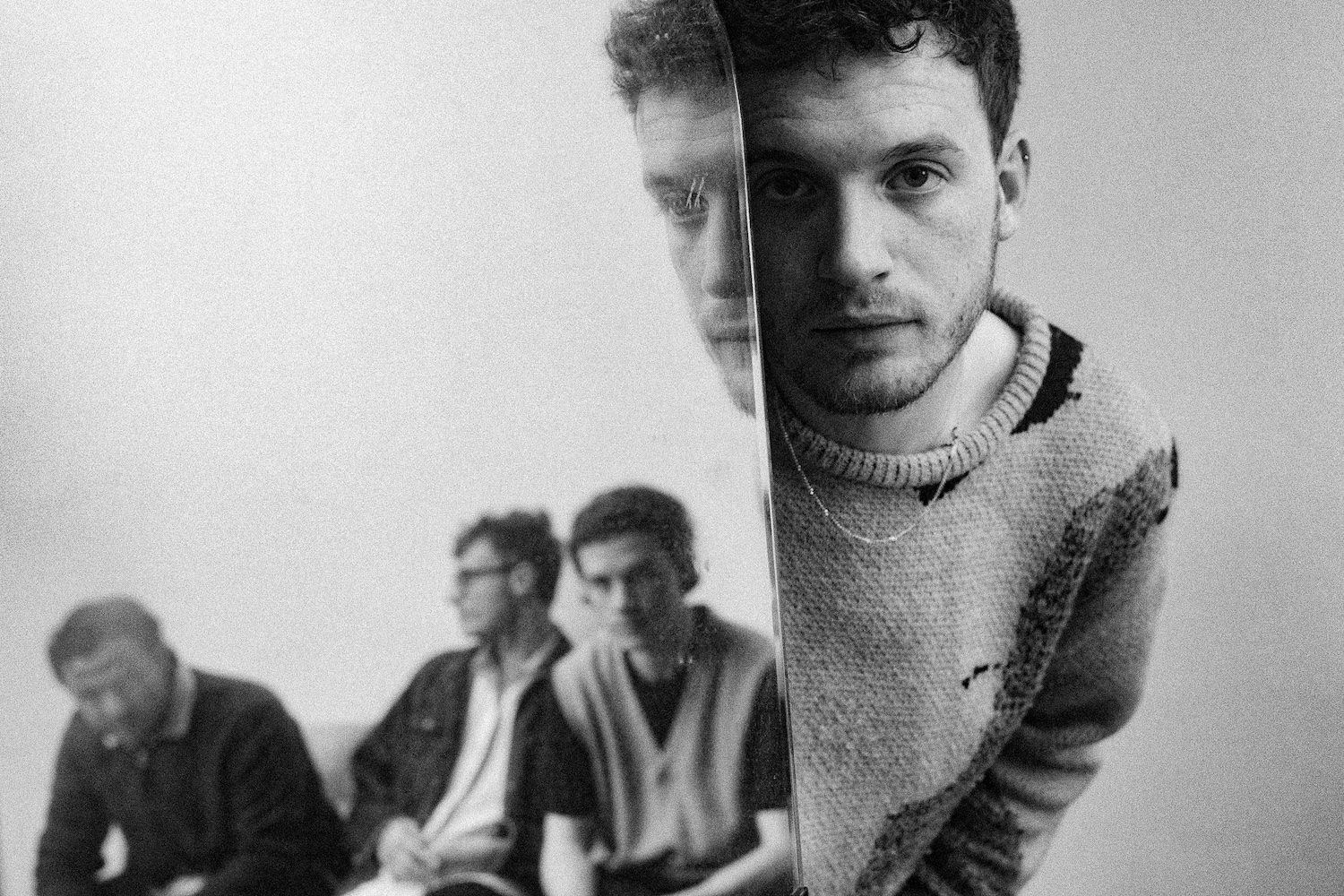
London-based dream rock band Junodream have been making waves with their debut album Pools of Colour. The album has already garnered critical acclaim, praised for its intricate compositions and thematic depth (be sure to read our five-star review).
In this exclusive interview with whynow, band members Tom Rea and Dougal Gray discuss the inspiration behind their music, the creative process, and what’s next for Junodream.
Dive into the expansive, DIY world of Junodream as they explore themes of space, alienation, and wonder while revealing the journey behind their mesmerising debut.
Interview with Tom Rea and Douglas Gray of Junodream
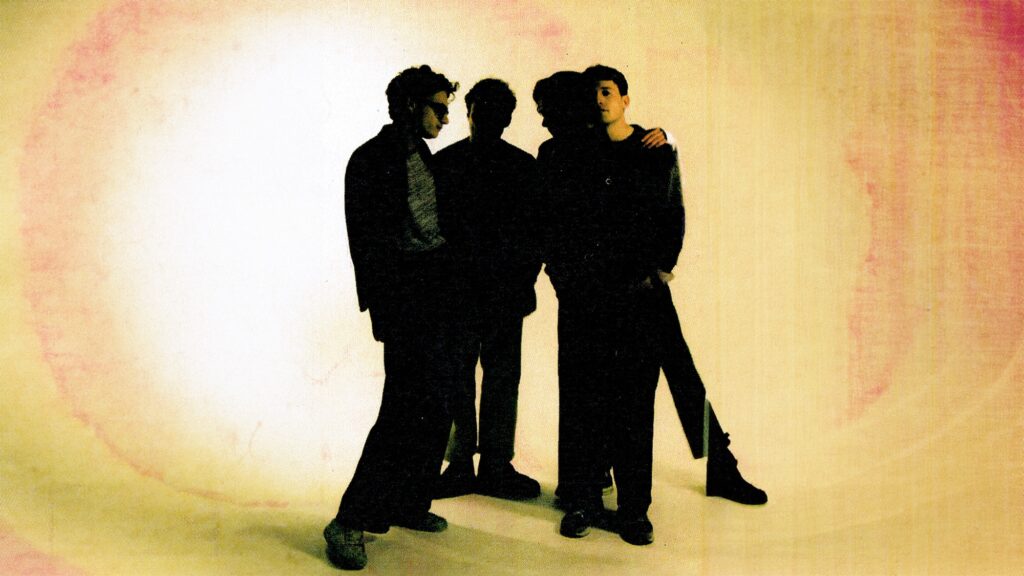
whynow: Hi Tom and Douglas! Thanks for taking the time out to chat with us today. Congratulations on the release of a stellar debut album. How was the listening party for it? Did the spatial audio format enhance the experience?
Tom Rea: Yeah, it was really, really good. Actually, it was a unique listening experience. It’s bizarre because a place like that offers something different. I’m unsure if I would want to listen in spatial audio the entire time, though. So much music is made for stereo, so it’s a bit novel. Going into Atmos is cool because many people can hear certain parts more clearly.
whynow: Were there any parts that sounded different from how you’d have liked them to?
Tom Rea: No, no, I did like the way it sounded. But it’s just a bit different. You’re creating it in one way, and then you’re doing it in this new Atmos way to keep Apple and others happy. No one’s going in making a record thinking, “Let’s make this for spatial.” The fans and friends who came along seemed to really love it. Those who knew about spatial knew the middle seats were the hot seats. At the start, I went right down to the front, but all you get there is bass. You need to position yourself in a good spot, the sweet spot. Overall, it was really cool.
whynow: To kick things off, could you tell us a bit about the Junodream origin story? How long have you been together, and what are your musical backgrounds?
Tom Rea: We’re all in our late 20s now, creeping in on that 30 mark, but we met at school, forming an awful school band. We were kind of alright, actually. We had a production deal and were making indie pop songs. We didn’t really know enough about music, about all these great bands we hadn’t heard of. We took a few years off and reformed around the last year of uni.
The bulk of us were in Bristol at different unis. We started Junodream in 2018 but for a month, we were called Paint because we bumped into Paolo Nutini in a pub in Bristol. He came back to ours and at two in the morning we drunkenly asked him for a new name. He looked at the wall and said, “Paint”. But we realised after a month it was a stupid name. So, we settled on Junodream (which means nothing). We went very DIY in everything we did, from recording and mixing to artwork and music videos.
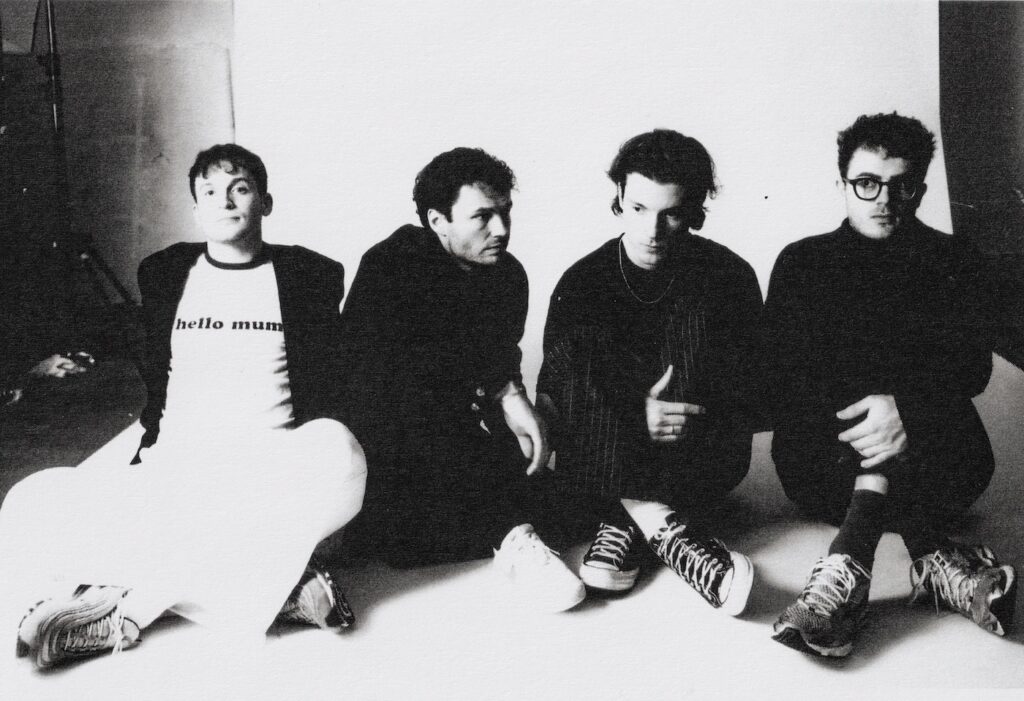
whynow: So you were at university together in Bristol; where are you all from originally?
Tom Rea: We’re from various places in southern England. Dougal’s from London, Jake and Ed are from Andover, and I’m from Malvern in the West Midlands.
whynow: Let’s dive into the themes around the album. Texturally, it seems like you’re very intelligent songwriters. It’s a suspiciously good debut album. Our writer, Dan, gave it five stars. You’ve been together for a long time, so what are you trying to say about individualism, and how is it explored on the album?
Dougal Gray: We’re not very preachy people. We think quite seriously about the songs we write. We didn’t want to write ten catchy songs about relationships. We wanted to touch on different themes of how we live our lives without being preachy. It was a challenge, but we wanted to synthesize the emotions we’re feeling living in this time.
I think that was the initial thing. Initially, we thought of doing a concept album about someone abducted by aliens, but it was too niche. We started building songs around different themes like ‘Kitchen Sink Drama’, which is a relationship song, and ‘Fever Dream’, which is about the digital age. We realised that a feeling of space, alienation, and wonder runs through all our music. Once we got those three words, we knew what Junodream was about.
whynow: How do you handle the dynamics within the band, especially when it comes to dealing with individual egos and maintaining a cohesive, creative vision?
Tom Rea: I think it’s important to say that we’re not egoless at all. We’re all anxious, fragile people. As much as we try individually to remove ego from it, it will inevitably always be there. It’s just about how you deal with that. Dealing with each other’s ideas and thoughts can be tricky in a creative space. We have to really try to remove ego from that.
The whole idea of being egoless and DIY comes back to a shared concept and discovery of what Junodream is. It’s about common themes like space, alienation, and wonder. These big themes, like fear and loneliness, are very human. Conversations and realisations with each other have almost bound our thoughts together and helped us find out more about what Junodream is. It’s a journey of discovery, finding out how to translate and communicate these ideas.
It’s about learning about each other, not as individuals, but as a collective. These core things keep us ticking over in this world as humans. The joy is in the journey of discovery and the shared creative process.
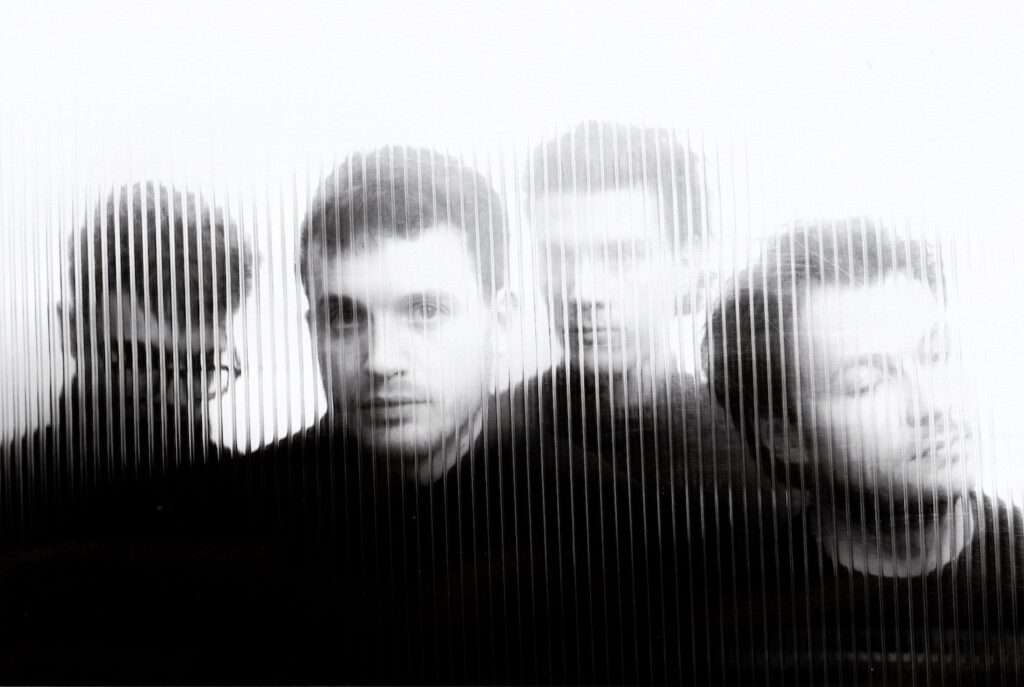
whynow: Can you tell us about the visual campaign for your album? How did you come up with the concepts for the artwork, and how did they tie into the themes of the album?
Dougal Gray: Once we had the keywords, bringing the campaign visually together, suddenly all came quite quickly. A big running theme of the album is the word “space”, which we attached to the idea of scale as well. We wanted to explore moments in life, whether they’re tiny or microscopic. There’s so much to be drawn out of many moments, whether it’s a look someone gives you or being completely silent in a kitchen with someone, and all the words that aren’t spoken in that tiny space and time. You can really draw out the fabric of those moments into a three to four-minute song, exploring all those emotions and notes. Scale and space are really important.
For the artwork, we got in touch with a wonderful, very talented photographer named Neelam, who we had worked with before. She was on tour with Weyes Blood at the time. We sent her a brief for ‘Kitchen Sink’, saying we wanted to take seemingly meaningless things, get amazing photos of them, and crop them into artwork. She sent back a photo that became the cover for ‘Kitchen Sink Drama’. The original photo is much bigger, but once you zoom in and crop it, it becomes this incredible explosion of mesmerising patterns. We thought, right, let’s get more. While she was on tour, she took pictures of seemingly banal things like a motorway or an autobahn in Germany and a thicket for ‘The Beach’. We’re actually showcasing a lot of this art direction at a pop-up this Saturday.
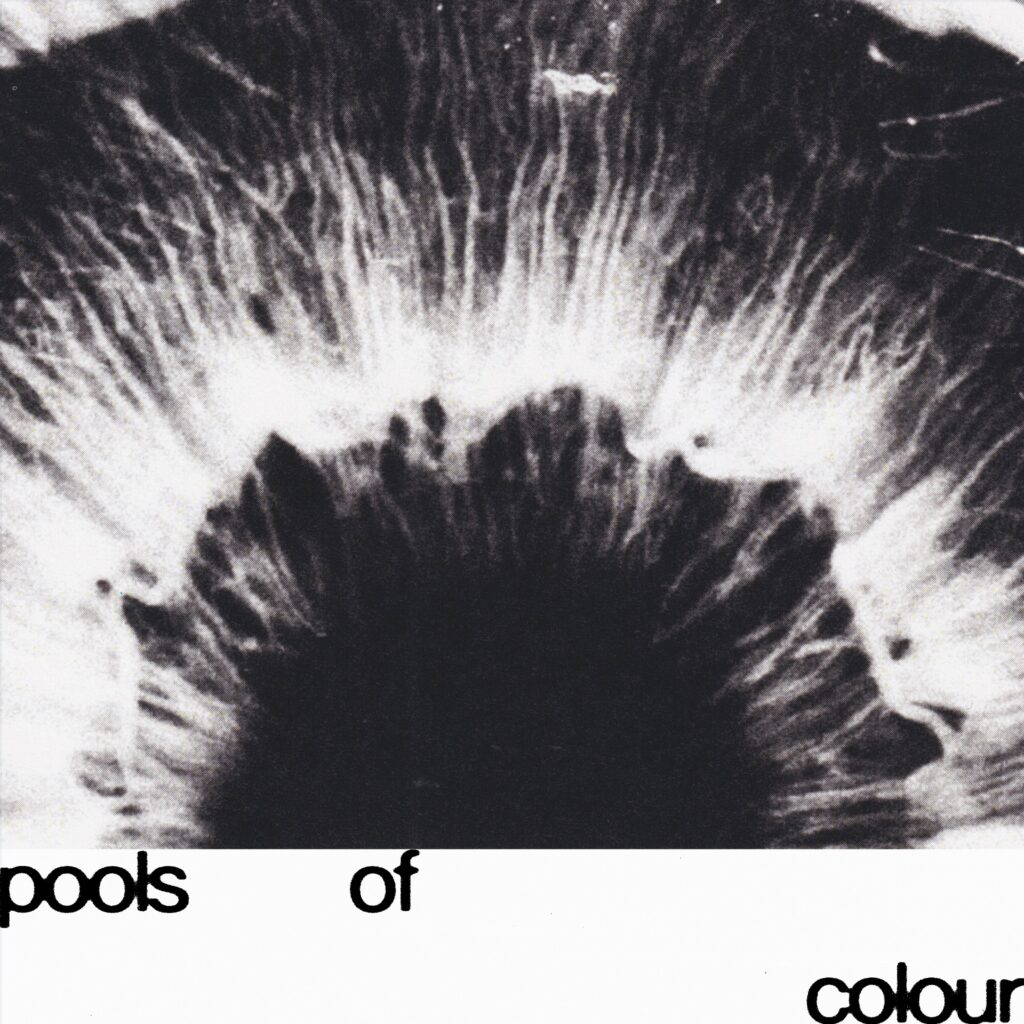
The main cover for Pools of Colour is actually an iris. We went through loads of pictures of eyes, had friends take them, and then Neelam edited them to abstract them. We wanted to create something where you can’t tell what it is at first, but when you realise it, you say, “Oh my God…” Eyes are the windows to the soul and how we perceive the world, making them the most significant image to lead on. The main track is about someone who gets a neural link implanted in their head and then goes blind as a result. The eye has serious significance, but it’s also one of the most amazing things once you start thinking about what an eye does, what it looks like, and how many billions of sensors it has that allow us to see.
whynow: What are your plans for your next album? How do you approach creating new music, and do you have any themes or concepts in mind for the future?
Dougal Gray: We’re always scheming. We finished this album over a year and a half ago, and since then, we’ve been working on loads of new music. We’re kind of in a similar process now, with 50 to 70 ideas ranging from pretty complete songs to just a chorus recorded on an iPhone. We have a communal SoundCloud where we chuck ideas into, and it’s a great process. I might put something in there without thinking much of it, and Tom will come back and be like, “Oh my God, that’s great. This is where it should go.”
Similarly, with lyrics, Tom and I often write songs and murmur words, and then one of us will go, “Oh my God, you said this, that means this,” and the other will be like, “Er yeah, sure, that’s what I meant.” We’re very much in this process now where the focus is coming in. We’ve got a concept and a name, with some serious themes we want to explore, which we didn’t quite delve into with the first one.
Sonically, it will be an extension of what we’ve done, continually refining and discovering what Junodream is. I think the second record will be much closer to whatever that thing is. Thematically, it’s going to hit really hard.
whynow: What are some of your influences outside of music? Are there any films, books, or other forms of art that inspire your songwriting and creative process?
Tom Rea: Film is a big one for me. Many things that inspire me when I watch a film are similar to a great conversation. Sometimes, you meet someone and have a profound conversation that puts you in a different headspace. It’s the same with a great film. Movies like Eternal Sunshine of the Spotless Mind or Boyhood filmed over 15 years ago, hit you with nostalgia and anxiety. They capture big concepts of time and insignificance. Those are the kinds of moments that everyone enjoys—moments of connection and escapism. Watching a film, listening to music, or visiting an art gallery, you want to escape, not because life sucks, but to travel in your mind in a thought-provoking way. All of those things can be inspiring.
Dougal Gray: To add to that, a book that influenced me and informed some of our music is A Short History of Nearly Everything by Bill Bryson. None of us are particularly proficient scientists, and I always struggled with science. But this book condenses the history of science from the Big Bang to today in the most eloquent, human, charming, and sometimes very emotional language. It’s like an agnostic Bible. It shows how much we know and yet how much we don’t know and will probably never know. It’s a good grounder, whether you’re feeling too big for your own boots or incredibly sad. It helps put things in perspective.
Tom Rea: Another influence is the book The Happiness Advantage. We have a song on the album with that title. The initial inspiration for the title came from this book, which was about the financial crisis and how businesses employed psychologists to help people’s mental health, which in turn helped the economy recover. The greater point was about the benefits of looking at things half-full. Humans have a negative bias, but reshaping thoughts can lead to great outcomes. That’s how inspiration from the outside crept into the album with The Happiness Advantage.
Tom Rea: In terms of music, generally, there are group collective inspirations like Air, Radiohead, trip-hop stuff like Massive Attack, Moby, Portishead, and Yo La Tengo. Tame Impala’s second record is a big inspiration for us too. Individually, we all have our own thing. Myself, I’m into more cinematic music scores and ambient music. Dougal is into what we call ‘slacker folk,’ and traditional Irish music. Jake is big into his 80s stuff. We all grew up on the greats—Elvis, The Beatles, Pink Floyd, Van Morrison. There’s a real range, but the common theme is tracks with unique songwriting or production.
Keep up to date with the best in UK music by following us on Instagram: @whynowworld and on Twitter/X: @whynowworld

